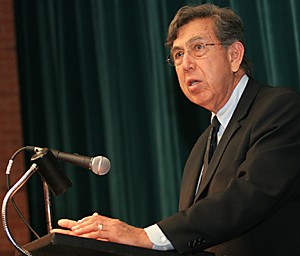Foreign RELATIONS
A former mayor of Mexico City and three-time Mexican presidential candidate called for improved trade agreements in North America and addressed U.S. immigration policy in a speech Friday.
About 100 students, professors and Tucson community members listened to CuauhtǸmoc CÇrdenas explain the need for a revision of the North American Free Trade Agreement between Canada, the U.S. and Mexico. He suggested the countries adopt a system similar to that of the European nations to help eliminate social and economic differences and combat immigration issues.
After his speech, CÇrdenas fielded questions from the audience and addressed the importance and potential effects of the recent protests of immigration bills in the U.S.
CÇrdenas said progressive sectors in Mexico consider NAFTA part of an attempt by the U.S. to subordinate the Latin American economy to the U.S. economy and to consolidate U.S. political control.
CÇrdenas cited figures indicating a decrease in Mexican exports with NAFTA and explained the negative agricultural effects of NAFTA -ÿwhich have resulted in increased migration to the U.S.
In addition, he said NAFTA has had negative effects in agricultural markets such as that of cereal, beans and vegetable oils, which have increased poverty and consequently prompted immigration to the United States.
He said millions of Mexican immigrants send more than $20 billion annually to Mexico.
“”(This is) one of the most indicative, shameful and worrisome facts of Mexico’s social situation,”” he said.
CÇrdenas said different areas made it evident that a revision of NAFTA was needed.
“”We now face the need of revising NAFTA … in those areas in regards to those products in which there exists damage or risk of damage of national production,”” he said.
CÇrdenas proposed what he called a “”continental agreement for development and trade”” which he said would have a broader scope than NAFTA that would not be limited to trade, but would also be geared toward improving the living standards of the participants.
CÇrdenas acknowledged that the undertaking of such a proposal would take time.
He said the magnitude of the impact labor migration has on both countries is reflected on the recent talks held by officials on both sides of the border, the large number of protesters and recent legislature being proposed in the U.S. Congress.
CÇrdenas said both Mexico and the U.S. have to work closely to protect the rights of Mexican workers.
It’s a great honor to someone like him who is very knowledgeable because our two countries are very interconnected.
senior majoring in Spanish
“”The U.S. government and the U.S. society (should) recognize the valuable and indispensable contribution immigrants and in a vast proportion undocumented laborers give to the focus of this nation, to their work, their taxes, their culture, now evident all over the nation,”” he said.
He further condemned the bill that proposes placing a fence on the border, criminalizing undocumented workers and making it a felony to help them.
“”(The bill) is an aggressive, racist, inhumane and unrealistic proposal,”” he said.
The talk was followed by questions of the audience, many of which were asked in Spanish.
Responding to a question about the protests, he said he thought it was important that so many people have been vocal about immigration reform proposals.
“”(The protests) help, without a doubt, for society to become conscientious,”” he said. “”They may influence legislation in the Congress of the United States,”” he said in Spanish.
Karissa Johnson, a history sophomore, said she attended because her teacher was offering extra credit for those who went, but CÇrdenas confirmed some of the things she learned in her history class.
“”I found his opinions reiterated the misconceptions people have about foreign relations with Mexico,”” she said.
Other students attended the talk because they admire CÇrdenas as a leader.
“”I’m from Mexico and I thought it was a great opportunity to know what he thinks about the whole situation,”” said Gabriela Poepsel, a journalism junior. “”I think with all the experience he has, he knows what the main problems are with the nation regarding the situation with the immigrants,”” she added.
Other students like Daniel Barajas stood in line at the end of the talk to shake CÇrdenas’ hand, take pictures or talk to him.
“”Seeing a character like him come here motivates me to help people, too. That’s what he’s doing,”” said Barajas, a public health junior.
Claudia Valdez, a senior majoring in Spanish, said she attended the talk because she wanted to hear a different side of border issues.
“”It’s a great honor to meet someone like him who is very knowledgeable because our two countries are very interconnected,”” she said.
Amie Kiddle, a history graduate student, said she maintained contact with CÇrdenas after being his student at another college. When she invited him to speak at the UA, he agreed.
“”I was really surprised,”” Kiddle said.
She added that she was really happy with the number of people who attended.
“”I was thrilled. We hoped there would be a turnout like this,”” she said. “”(It was) exactly what we hoped for.””









